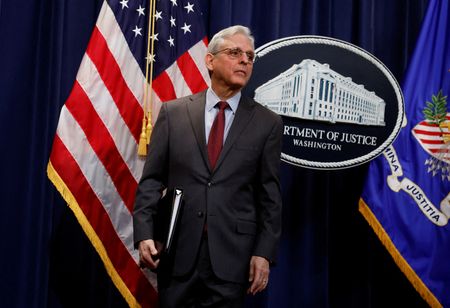 1
1 1
1
By Sarah N. Lynch
WASHINGTON (Reuters) -The U.S. Justice Department on Wednesday announced federal and local criminal charges targeting 78 defendants across 16 states as part of a law enforcement action involving $2.5 billion in alleged healthcare fraud schemes targeting elderly and disabled people, HIV patients and even pregnant women.
The cases range from allegations of falsely billing the federal Medicare insurance program for elderly and disabled Americans and paying illegal kickbacks, to the illicit diversion of expensive prescription medications and the improper dispensing of highly addictive opioid pain killers.
Among those facing charges include 24 doctors, nurses and other licensed medical professionals, as well as healthcare executives including the current and former CEOs of a durable medical equipment online platform accused of falsely billing $1.9 billion in fraudulent claims.
Of the $2.5 billion in alleged fraudulent claims to Medicare, state Medicaid programs that serve the poor and supplemental Medicare insurance programs offered by private insurers, about $1.1 billion was actually paid out to the fraudsters, officials said.
“The Justice Department will find and bring to justice criminals who seek to defraud Americans and steal from taxpayer-funded programs,” Attorney General Merrick Garland said in a statement.
The charges, filed or unsealed from June 12 through to Wednesday, involved a series of cases comprising similar types of schemes.
Some cases were tied to expensive HIV medications, which can fetch Medicare reimbursement rates as high as $10,000 for a month’s supply. In one case, the owner of a pharmaceutical wholesale distribution company was charged in New Jersey with illegally purchasing diverted HIV drugs and then re-selling the medication by falsely claiming it was acquired through legitimate channels.
In another case, federal officials announced an indictment against a business owner in Wisconsin accused of preying on low-income pregnant women by enticing them to sign up for prenatal care services, and submitting phony claims for services never rendered.
Many typical Medicare fraud cases target elderly or disabled patients who are tricked into providing their personal insurance information to telemarketers who promise them they can receive some sort of testing, medical equipment or other service paid for by Medicare at no expense to them.
In such schemes, doctors who often have no actual relationship to the patients then rubber-stamp the orders by falsely certifying they are medically necessary.
The claims get submitted to federal or state insurance programs for reimbursement. Frequently, each person who contributes to the scheme receives a payment in the form of an illegal kickback or bribe.
The types of medical services at the heart of such schemes usually involve those that pay the highest reimbursement rates. Past examples of such services targeted by fraudsters have included durable medical equipment, genetic testing and other lab diagnostic services.
(Reporting by Sarah N. Lynch; Editing by Will Dunham)